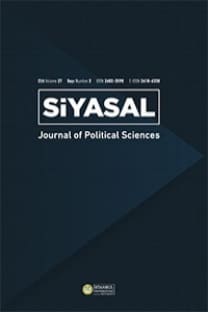Türkiye’de Siyasi Partilerin Seçim Beyannamelerindeki Politika Öncelikleri, 2002–2015
Bu çalışmada Türkiye’deki başlıca siyasi partilerin 2002-2015 dönemindeki seçim kampanyalarında hangi politika alanlarını vurguladıkları incelenmektedir. Yanıt aranan temel sorular şunlardır: Siyasi partiler hangi politika alanlarına öncelik vermektedir? Partiler arasında öncelik verilen politika alanları açısından önemli farklılıklar gözlenmekte midir, yoksa tüm büyük partilerin vurguladığı ortak politika alanları var mıdır? Partilerin politika alanı önceliklerinde zaman içerisinde ne gibi değişimler görülmektedir? Son olarak, partilerin öncelik verdiği politika alanları, halk tarafından ülkenin karşı karşıya olduğu önemli ve ciddi meseleler olarak görülen alanlar ile örtüşmekte midir? Bu sorulara yanıt vermek için partilerin politika önerilerinin resmi beyanını sunan seçim beyannameleri incelenmiştir. Bu çalışmanın sonucu ekonomi ile refah ve yaşam kalitesi alanlarına ilişkin politika önerilerinin Türkiye’deki dört büyük siyasi partinin 2002-2015 dönemindeki seçim beyannamelerinde en sık yer bulan konular olduğuna işaret etmektedir.
Anahtar Kelimeler:
Siyasal Partiler, Seçim Beyannameleri, Politika Öncelikler, Seçimler, Türkiye
Policy Priorities in the Election Manifestos of Political Parties in Turkey, 2002–2015
The policy areas prioritized by the major Turkish political parties during the election campaigns between 2002 and 2015 are examined in this study. The main questions to be addressed are as follows: Which policy areas do the political parties prioritize? Is there a significant divergence in the prioritization of different policy areas or are there common themes that are emphasized by all parties? Are there trends regarding the parties’ policy priorities over time? And finally, do the policy areas, as prioritized by the parties, correspond to what the public considers as important issues? To address these questions, the election manifestos of the four major Turkish political parties are analyzed. The analyses show that policy areas related to the economy, welfare, and quality of life are the most recurring themes in the election manifestos of the four major Turkish parties between 2002 and 2015.
Keywords:
Political parties, Election manifestos, Policy priorities, Elections, Turkey,
___
- Atmış, E. & Günşen, H. B. (2016). Türkiye’de 2015 yılı genel seçimlerinde siyasal partiler ve ormancılık ilişkileri. İstanbul Üniversitesi Orman Fakültesi Dergisi, 66(2), 587-599.
- Avcı, G. (2011a). The Justice and Development Party and the EU: Political pragmatism in a changing environment. South European Society and Politics, 16(3), 409-421. http://dx.doi.org/10.1080/13608746.2011.598357
- Avcı, G. (2011b). The Nationalist Movement Party’s Euroscepticism: Party ideology meets strategy. South European Society and Politics, 16(3), 435-447. http://dx.doi.org/10.1080/13608746.2011.598359
- Aydoğan, A. & Slapin, J. B. (2015). Left–right reversed: Parties and ideology in modern Turkey. Party Politics, 21(4), 615-625. https://doi.org/10.1177/1354068813487280
- Başkan, F. & Gümrükçü, S. B. (2012). Positions of Turkish political parties on European integration. Southeast European and Black Sea Studies, 12(1), 25-44. http://dx.doi.org/10.1080/14683857.2012.661220
- Bayram, S. (2015). Where the AKP stands: A Manifesto-Based Approach to Party Competition in Turkey. New Middle Eastern Studies, 5,1-19. Retrieved from http://www.brismes.ac.uk/nmes/archives/1372
- Çarkoğlu, A. (1998). The Turkish party system in transition: Party performance and agenda change. Political Studies, 46(3), 544-571. http://dx.doi.org/10.1111/1467-9248.00154
- Dahl, R. (1971). Polyarchy: Participation and opposition. New Haven, CT: Yale University Press. Dikici Bilgin, H. (2008). Foreign policy orientation of Turkey’s pro‐Islamist parties: A comparative study of the AKP and Refah. Turkish Studies, 9(3), 407-421. http://dx.doi.org/10.1080/14683840802267363
- Dikici Bilgin, H. (2017). Westernist sceptics and anti-western reformers in the Turkish party system. Journal of Balkan and Near Eastern Studies, 19(2), 191-208. http://dx.doi.org/10.1080/19448953.2016.1155904
- Downs, A. (1957). An economic theory of democracy. New York: Harper & Row. Fernandez-Vazquez, P. (2014). And yet it moves: The effect of election platforms on party policy images. Comparative Political Studies, 47(14), 1919-1944. http://dx.doi.org/10.1177/0010414013516067
- Hobolt, S. B. & Klemmemsen, R. (2005). Responsive government? Public opinion and government policy preferences in Britain and Denmark. Political Studies, 53, 379-402. http://dx.doi.org/10.1111/j.1467-9248.2005.00534.x
- Kavas Urul, A. & Sertesen, S. (2015). Siyasi partilerin seçim beyannamelerinde yerel yönetimler. Türkiye Ekonomi Politikaları Araştırma Vakfı Değerlendirme Notu, http://www.tepav.org.tr/upload/files/1433323934-7.Siyasi_Partilerin_Secim_Beyannamelerinde_Yerel_Yonetimler.pdf.
- Kıratlı, O. S. (2015). European integration policy in Turkey: A comparison of the Republican People’s Party (CHP) and the Nationalist Movement Party (MHP), 1965–2011. Southeast European and Black Sea Studies, 15(3), 261-279. http://dx.doi.org/10.1080/14683857.2015.1030192
- Manin, B., Przeworski, A. & Stokes, S. C. (1999). Elections and representation. In Przeworksi, A., Stokes, S.C. & Manin, B. (Eds.), Democracy, accountability, and representation (pp. 29-54). New York: Cambridge University Press.
- Page, B. I. & Shapiro, R. Y. (1983). Effects of public opinion on policy. American Political Science Review, 77(1), 175–190. https://doi.org/10.2307/1956018
- Page, B. I. & Shapiro, R. Y. (1992). The rational public: Fifty years of trends in American policy preferences. Chicago IL: University of Chicago Press.
- Quinn, T. (2014). Mandates, manifestos, and coalitions: UK party politics after 2010. London: The Constitution Society.
- Sartori, G. (1976). Parties and party systems: A framework for analysis. New York: Cambridge University Press.
- Stimson, J. A., MacKuen, M. B. & Erikson, R. S. (1995). Dynamic representation. American Political Science Review, 83(3), 543–565. https://doi.org/10.2307/2082973
- Stokes, S. C. (1999). Political parties and democracy. Annual Review of Political Science, 2, 243-267. https://doi.org/10.1146/annurev.polisci.2.1.243
- Tok, T. N. (2012). Türkiye’deki siyasal partilerin eğitim söylemleri ve siyasaları. Kuram ve Uygulamada Eğitim Yönetimi, 18(2), 273-312.
- Turper, S. (2017). Public opinion and public policy in Turkey. Unpublished manuscript, Koç University.
- Volkens, A., Lehmann, P., Matthiess, T., Merz, N. & Regel, S. (2016). The manifesto data collection. Manifesto Project (MRG/CMP/MARPOR). Version 2016b. Berlin: Wissenschaftszentrum Berlin für Sozialforschung (WZB).
- Yanık, L. K. (2012). Foreing policy during 2011 parliamentary elections in Turkey: Both an issue and non-issue. Turkish Studies, 13(2), 213-227. http://dx.doi.org/10.1080/14683849.2012.685255
- Yayın Aralığı: Yılda 2 Sayı
- Başlangıç: 1983
- Yayıncı: İstanbul Üniversitesi
Sayıdaki Diğer Makaleler
Sürdürülebilir Kentsel Gelişme ve Yeşil Alanlar
Eastfalya Uluslararası Düzeninin İmkânının Değerlendirilmesi
Türkiye’de Siyasi Partilerin Seçim Beyannamelerindeki Politika Öncelikleri, 2002–2015
Sovyetler Birliği’nde Rus Milliyetçiliği ve Rus Milli Kimliğinin Gelişimi
Gelenekle Sol Arasında Sıkışmış Bir Siyasal Hareket: (Türkiye) Birlik Partisi
